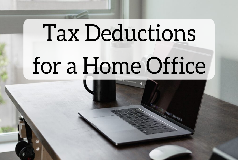Blog 
Click here to go back
Check our blog for updates on regulations or resources that can be used to help you and your business achieve your financial goals.
What Taxpayers Need to Know About the Home Office Deduction
 The home office deduction allows qualifying taxpayers to deduct certain home expenses on their tax return. With more people working from home than ever before, some taxpayers may be wondering if they can claim a home office deduction when they file their 2020 tax return next year.
The home office deduction allows qualifying taxpayers to deduct certain home expenses on their tax return. With more people working from home than ever before, some taxpayers may be wondering if they can claim a home office deduction when they file their 2020 tax return next year.
Here are some things to help taxpayers understand the home office deduction and whether they can claim it:
- Employees are not eligible to claim the home office deduction.
- The home office deduction is available to both homeowners and renters.
- There are certain expenses taxpayers can deduct. They include mortgage interest, insurance, utilities, repairs, maintenance, depreciation and rent.
- Taxpayers must meet specific requirements to claim home expenses as a deduction. Even then, the deductible amount of these types of expenses may be limited.
- The term "home" for purposes of this deduction:
- Includes a house, apartment, condominium, mobile home, boat or similar property.
- Also includes structures on the property. These are places like an unattached garage, studio, barn or greenhouse.
- Doesn’t include any part of the taxpayer’s property used exclusively as a hotel, motel, inn or similar business.
- There are two basic requirements for the taxpayer’s home to qualify as a deduction:
- There must be exclusive use of a portion of the home for conducting business on a regular basis. For example, a taxpayer who uses an extra room to run their business can take a home office deduction only for that extra room so long as it is used both regularly and exclusively in the business.
- The home must be the taxpayer’s principal place of business. A taxpayer can also meet this requirement if administrative or management activities are conducted at the home and there is no other location to perform these duties. Therefore, someone who conducts business outside of their home but also uses their home to conduct business may still qualify for a home office deduction.
- Expenses that relate to a separate structure not attached to the home will qualify for a home office deduction. It will qualify only if the structure is used exclusively and regularly for business.
- Taxpayers who qualify may choose one of two methods to calculate their home office expense deduction:
- The simplified option has a rate of $5 a square foot for business use of the home. The maximum size for this option is 300 square feet. The maximum deduction under this method is $1,500.
- When using the regular method, deductions for a home office are based on the percentage of the home devoted to business use. Taxpayers who use a whole room or part of a room for conducting their business need to figure out the percentage of the home used for business activities to deduct indirect expenses. Direct expenses are deducted in full.
Please contact our office to discuss the specific details of your situation and whether this deduction would be applicable to you.
Source: IRS Tax Tip 2020-98


